2021 Past Events
Fall 2021
Antiracism: Communities + Collaborations: Booksellers + Community Activism
Date: December 1, 2021
The Georgetown Humanities Initiative and the University of Maryland’s Center for Literary and Comparative Studies co-sponsored this webinar, centered on the work of community builders and activists who have built bookstores that empower and embrace diverse communities.
The event featured:
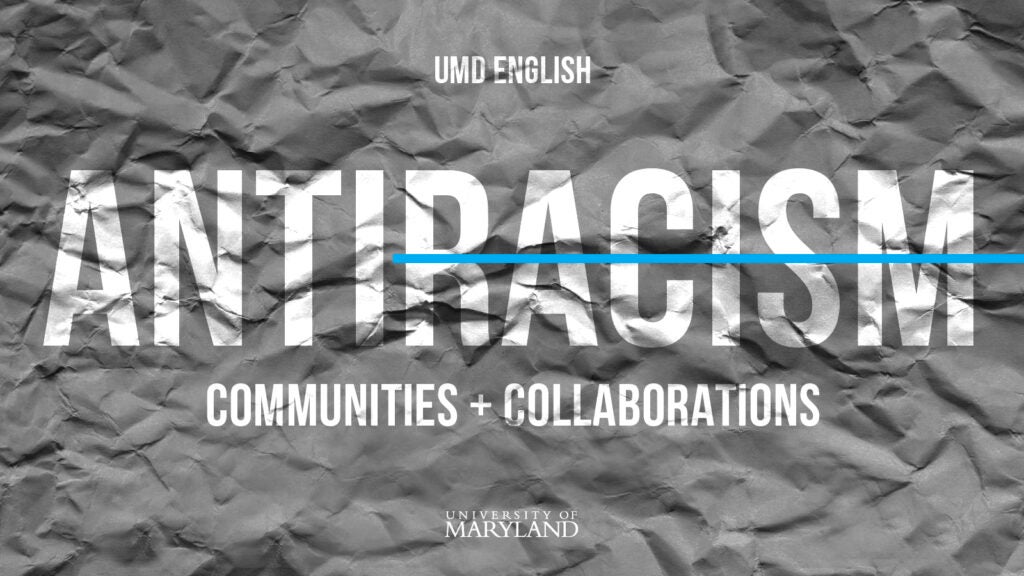
Ramunda Lark Young, an entrepreneur, speaker, and community advocate. She and her husband are the owners and co-founders of the nationally recognized Mahogany Books, a bookstore focused on books for, by, and about people of the African Diaspora in Washington, DC. Young has successfully worked with celebrity authors like ballet icon Misty Copeland, R&B legend Charlie Wilson, Civil Rights leader Congressman John Lewis, and award-winning actor Omar Epps; and
- Angela Maria Spring, a poet, journalist, and editor. She has worked in bookstores in New Mexico, New York City, and D.C. for almost two decades. In 2017, she decided to create a flexible, financially viable bookstore model that empowered and embraced diversity in bookselling, writing/art, and in our communities. She hence launched Duende District Bookstore, a unique pop-up boutique bookstore run by people of color for people of color, and was moderated by:
- Chanel Williams, a grad student in the M.A. Program in Engaged & Public Humanities. She has used her career as a public relations professional to center her passion for making arts and culture institutions more accessible and inclusive through storytelling. Having supported the mission, vision, and values at both the Smithsonian Institution and The John F. Kennedy Center for the Performing Arts, she often embraces the themes of empathy and equity in her PR practice. As a native of the DMV, she knows the impact that D.C. memorials, museums, performing arts venues, and cultural institutions have on enriching the lives of native Washingtonians and the nation more broadly; and
- Diana Proenza, second-year Ph.D. student in the Department of English at the University of Maryland, College Park and graduate of the New College of Florida with a B.A. in English Literature and Art History. Her research pertains to the intersections between literature and visual/material culture, particularly in relation to 20th and 21st century women/gender studies and print history. Her recent undergraduate thesis explored feminist reconfigurations of subjectivity amidst post-WWI industry, fashion, and machinery in the little magazines of New York Dada. Her other areas of interest include multiethnic and global modernisms, archival/textual studies, indigenous and postcolonial theory, and trauma/memory studies.
The event was part of the University of Maryland’s Center for Literary and Comparative Studies’ “Antiracism: Communities + Collaborations” series, which features scholarship, teaching, and public engagement to reimagine boundaries, model antiracist literary and rhetorical inquiry, and foster collaborative relations across and beyond campus.
Humanities Round Tables: Humanities Alumni in Data Careers
Date: October 28, 2021
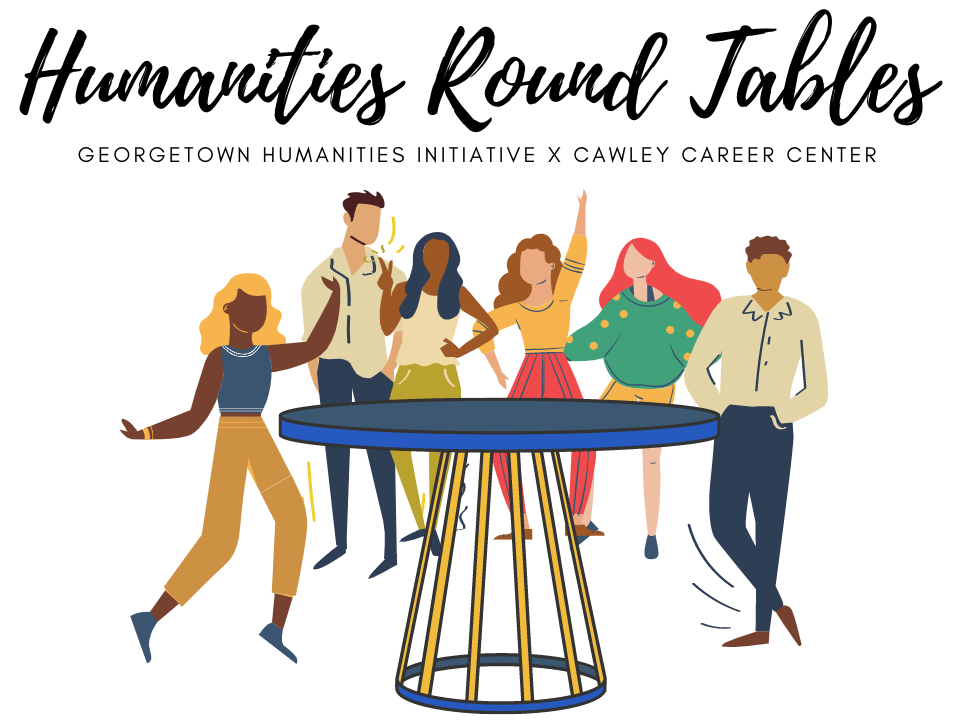
In this panel event, organized by the Georgetown Humanities Initiative and the Cawley Career Education Center, Georgetown alumnae shared how they translated their humanities background and passions into rewarding careers as technology entrepreneurs, analytics consultants, marketing experts, and data scientists, answering the questions of: What has the study of literature and the arts to do with the business of numbers? How can a degree in the humanities prepare you for careers in data analysis? They highlighted highly transferable skills that they drew from the humanities to shift their professional focus and have an edge in today’s fluid workplace.
The panelists included:
- Tiffany Hosey (C’92), BuilDATAnalytics.
- Sarah Dorfman (C’05), InterWorks.
- Katy Bohinc (C’07), Tender Buttons.
- Anne Popolizio (C’05), Social Squib.
Gatsby Unbound: The Future of an American Masterpiece Out of Copyright
Date: October 27, 2021
On January 1, 2021, The Great Gatsby entered The Public Domain, allowing this Great American Novel to be re-imagined for the 21st century and beyond. The panelists of this event discussed what lies ahead.
The panelists included:
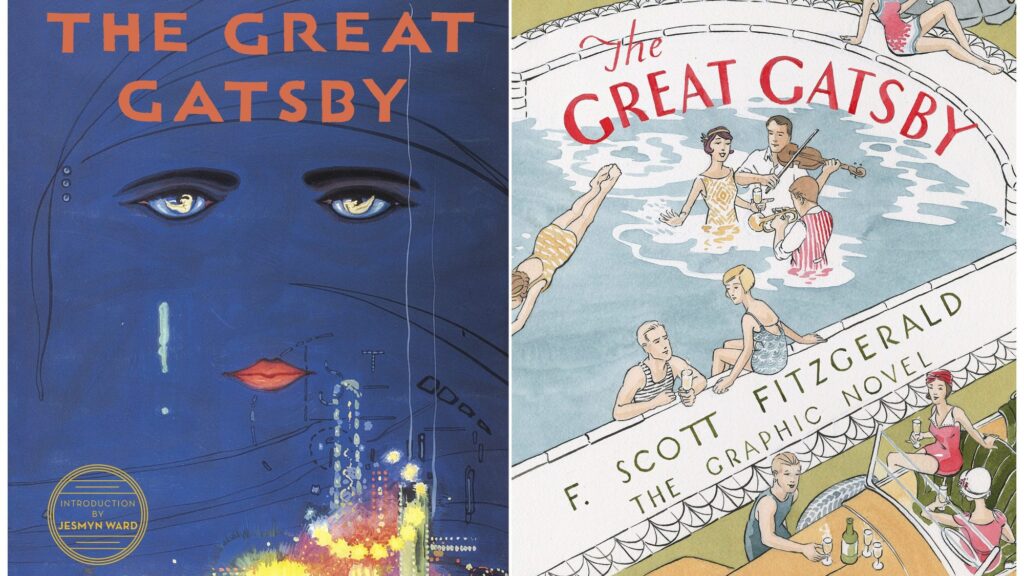
- Michael Cotey, Director & Producer.
- Maureen Corrigan, Author of So We Read On & Nicky and Jamie Grant Distinguished Professor of the Practice of Literary Criticism.
- Blake Hazard, Musician, Fitzgerald Estate Trustee, Great-Granddaughter of Scott & Zelda.
- Nghi Vo, Author of The Chosen and The Beautiful.
This event was sponsored by the Georgetown Deans’ Office and the Department of English.
Leadership Through the Humanities: Professional Perspectives
Date: October 21, 2021
One common way that humanities programs make the case for their importance is by pointing to the work they do to equip students with key skills, such as critical thinking, textual and visual analysis, and cultural competence, which will help them to succeed in a variety of careers after graduation. But how exactly does careful study of the humanities translate into better leadership practices? How transferable are the skills, habits, and wisdom gained from a humanities education to life in non-academic sectors?
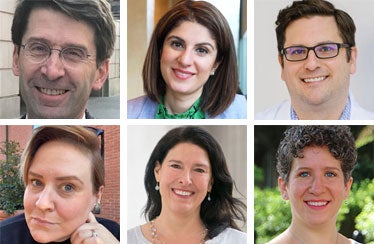
To answer these questions, the Georgetown Humanities Initiative partnered with Kallion, Inc., bringing together professionals from intelligence, medicine, and the civic sector who shared their personal perspectives on how their humanities educations have informed and shaped their professional leadership journeys. They discussed specific humanities artifacts –works of literature, art, songs, performances– that have had a significant impact on the way they have approached their leadership work in professional and personal contexts.
Their stories and conversation provided humanities undergraduate and graduate students with new ways to think and speak about their training, inspiring them to imagine new possibilities for their future paths. It encouraged humanities faculty to reimagine and redesign their work in the classroom as leadership trainers. And offered valuable reflections about the vitality of the humanities for the leadership development of everyone.
The panelists included:
- Andrew Gilmour, Scholar-in-Residence at the Center for the Study of Statesmanship, the Catholic University of America. He previously served as a senior intelligence expert on the Near East, South Asia, and Islam over a 32-year career at the Central Intelligence Agency in a range of managerial and analytic positions;
- Dr. Nadia Hashimi, Pediatrician, internationally bestselling author of novels for adults and acclaimed novels for children, and advocate for women and children. On days off from a busy emergency room and after years of avid reading, she began crafting stories that drew on her heritage and the complex experiences of Afghans. Her novels include The Pearl That Broke Its Shell (2014), When the Moon is Low (2016), A House Without Windows (2017), and Sparks Like Stars (2021). She was also the first Afghan American to run for Congress. She serves on the board of two non-profit organizations dedicated to education in Afghanistan;
- Dr. Jeffrey Katra, DO, MA. He received undergraduate degrees in history and government from Georgetown University (COL ’05), a Master’s Degree in history from the University of Virginia where he studied the intersection of politics and science in America, and a medical degree from the Philadelphia College of Osteopathic Medicine. He is also a certified hypnotherapist who specializes in chronic pain, phobias, and addictive behaviors;
- Ashley Robison, Associate Director of Global Programs in Alumni Relations at Tulane University. She is a seasoned non-profit manager with thirteen years of experience in programming, project management, communications, and audience engagement; and
- Susannah Wellford, Founder and President of Running Start, a nonpartisan organization which aims to inspire young women and girls to pursue political leadership.
Mallory Monaco Caterine (C’07), co-founder and co-executive director of Kallion Leadership, and a Senior Professor of Practice in Classical Studies and Greenberg Professor of Social Entrepreneurship at Tulane University, moderated the event.
Classroom to Career Series: Careers in Academia Post-Ph.D.
Date: October 14, 2021
Are you considering continuing your education to pursue a Ph.D.? Unsure about the opportunities and career prospects available to you after obtaining another degree? Interested in hearing from Georgetown graduates who have been there before?
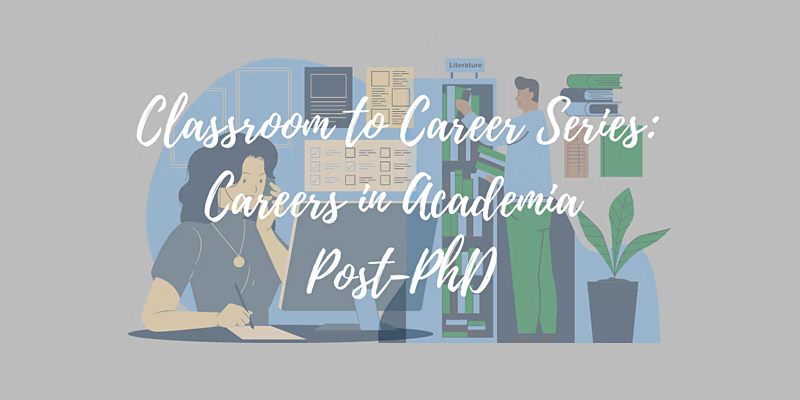
In this event, three alumni from the Department of English discussed the realities of the Ph.D., how one might approach finding the right career in academia or “alt academia,” and how skills learned in a humanities Ph.D. program can translate beyond a university setting. The conversation proved to be informative and candid for all who are curious about the Ph.D. and post-Ph.D. life.
The event was part of the professional development “Classroom to Career” series. It was co-sponsored by the English Graduate Student Association (EGSA) and the Department of English.
Accounting for That Which Has “No Account”: Daniel Defoe, Survival Emotions, and Our Fundamental Contradiction
Date: October 12, 2021
Survival emotions, often conceived of as biologically driven, are also culturally and socially formed; the way we think and feel about pandemics was shaped by early eighteenth-century reactions to crisis. Kathryn Temple examines these emotions through a reading of Daniel Defoe’s 1722 Journal of a Plague Year in light of what Duncan Kennedy has called the “fundamental contradiction,” that between our emotional attachment to “liberty,” versus our need for communities that protect that liberty. The great London plague of 1664-1665 killed an estimated 100,000 of 460,000 Londoners. But Defoe’s frenetic efforts to “account” for both the plague and reactions to it through detailed statistics and “scientific” observations failed miserably to explain the human reactions to what was actually a global pandemic.
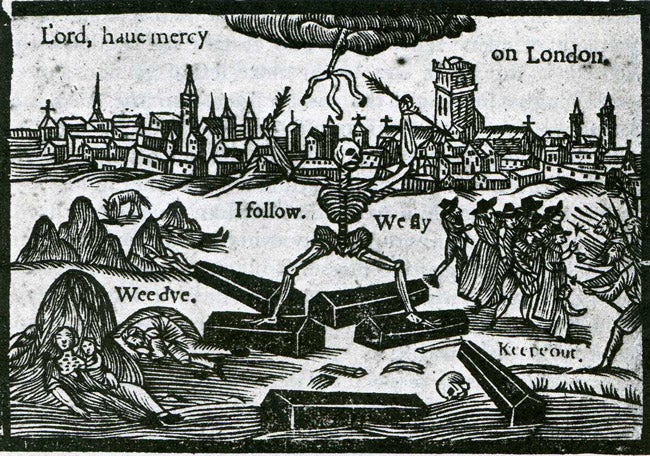
What Defoe does succeed at is the delineation of certain narrative conventions—including that of the spiritual inventory—that have driven pandemic narratives from the time of the Journal to today’s pandemic. In Defoe’s Journal the “fundamental contradiction” is expressed through this spiritual accounting as Defoe’s protagonist attempts to “account” not only for the pandemic but for his own and others’ reactions to it. In this online webinar Temple discussed her paper on Defoe’s Journal, followed by a Q&A moderated by Michael Scott.
The event was part of “The Christian Literary Imagination” series, sponsored by the Future of the Humanities Project, the Georgetown Humanities Initiative, and the Las Casas Institute (Blackfriars Hall, Oxford).
For One Day Only: Law, Space, Matter
Dates: September 9 and 10, 2022
Recent years have witnessed a new wave of critical approaches to (re-)thinking the entanglements of law, space and matter. From David Delaney’s ‘nomosphere’ and Peter Sloterdijk’s ‘nomotop’ to Andreas Philippopoulos-Mihalopoulos’s ‘lawscapes’ and Daniela Gandorfer’s ‘matterphorics’ – scholars working in diverse theoretical traditions have rejuvenated discussions on the substance and materiality of law, and opened new perspectives on the reciprocal materialisation of the legal and the socio-spatial.

Matter matters – all the more in our present age of crises and challenges, which press us towards a renewed critical reckoning with the relation(s) between law, place and space, between spatiolegal representations, discourses, and materialities. In this context, we turn again to “the complex, shifting, and always interpretable blendings of words and worlds” (Delaney) in which law is embedded and unfolds.
This virtual workshop for a non-travelling global audience brought together a global community of thinkers, scholars and artists for 24 hours of conversations on the moment we are living through and the future we want. Hosted by an international consortium of research centres spanning four continents, the workshop sessions rolled around the world from Canberra and Johannesburg, through Rome, Helsinki and Lucerne, to Virginia and Melbourne. Together, they showcased cutting-edge work that captures the stakes of critical, theoretical and socio-legal enquiry into the spatialisation of law and the legalisation of space, and which poses fresh challenges for thinking about law’s depth and character, its politics and social resonances.
The workshop included the following sessions:
- Market/Place: A Funny Thing Happened on the Way to the Forum, hosted by the Centre for Law, Arts and Humanities, The Australian National University, with Margaret Davies, Jessica Whyte, Chris Butler and Desmond Manderson: Legal space and legal geography have been important focuses of research in socio-legal scholarship in recent years. In what ways has the experience of public space been transformed under the pressures of neoliberal ideology and contemporary governmentality? How has biopolitics and securitization changed the materiality of public space and with what impacts on democratic life? How has COVID-19 constrained, revealed, or accelerated these processes? What are the opportunities or challenges facing us?
- Law, Politics and Emptiness, hosted by the Faculty of Law, University of Helsinki, with Panu Minkkinen and Dorota Gozdecka: Emptiness is assumed to be void of legal and political significance. Spaces without clear presence appear to have few connotations with the workings of the law and they are typically thought of as spaces that need to be filled. Law is usually seen as stepping in at the point when the emptiness is filled. This panel challenges these assumptions. It looks at emptiness generated by the law and explores different notions of emptiness and its significance for law, politics and ethics.
- Algorithms and the End(s) of Law, hosted by the Faculty of Law, University of Roma Tre, with Emanuele Conte, Giancarlo De Cataldo, Fiona Macmillan and Teresa Numerico: We understand law as a complex of abstractions by which communities agree to be bound. Definitions of rights and rules of procedure produce an agreed version of the “truth” or of reality. But it has not always been like this. For many centuries determinations of rights and remedies was entrusted to the will of “god” as interpreted by religious authorities. The concept of law emerged from this system of religious control as a response to the perceived need to humanize the system of justice. Now, the digital revolution has produced a new phase in the cycle in which algorithms, under the guise of operationalizing legal principles, are instead supplanting them and creating their own version of the truth. If law as we now know it begun at a certain point, can we also say that, thanks to the pervasive social power of technology, it is now at its end point?
- In the Eyes of the Law, talk and film screening with Carey Young and Desmond Manderson, hosted by the Institute for Interdisciplinary Legal Studies – lucernaiuris, University of Lucerne: Since 2003, visual artist Carey Young has developed a body of artistic work across multiple media that examines law’s relationship to ideas of space, language, performance, and materiality. Her talk will centre on a screening of Young’s noted video Palais de Justice (2017), in which the artist spent two years surreptitiously filming female judges and lawyers working at the main courthouse of Belgium. Using a painterly, hallucinatory aesthetic, the piece evokes a legal system centered on or controlled by women and explores intersections of power, gender and the ocular. Young will also include other examples of her law-based artistic works, which have conceptualised and explored law as an artistic medium. Young has collaborated with legal advisors to make artworks in installation, video, performance, print, sculpture, and photography, which also operate as bespoke legal instruments. These works have addressed disparate legal fields, including human rights, inheritance law, intellectual property and law relating to outer space. Experimenting with ideas of space, time, and materiality in relation to law, Young’s artistic work explores law as a separate kind of ‘reality’, one with its own inherent subjectivities and points of breakdown. Young’s talk was followed by a conversation with Desmond Manderson (ANU), and an open Q&A session. The workshop was moderated by Steven Howe (Lucerne).
- Immunity and Quarantine: The Biopolitics of Space-Making in Pandemics, hosted by the Institute of the Humanities and Global Cultures, University of Virginia & Wits Institute for Social and Economic Research, University of Witwatersrand, with Sarah Nuttall, Ranjana Khanna and Debjani Ganguly: “Immunity”, whether referring to the individual (the official, the diplomat, the patient, the police officer, the doctor) or to the group (civil officers, the police, pharmaceutical companies, the “herd,” or the population) has shuttled among the registers of language that are held responsible for human and social life. Used in law, medicine, politics, religion and philosophy, the idea of immunity underpins that which constitutes the human and its relation to the non-human, disease, impurity, danger, and spatial containment. If natural immunity is the ability to resist infection, legal immunity is the granting of an exemption by a higher authority. In the case of ecclesiastical immunity, immunity is an exception from secular or civil duties. The afterlife of this ecclesiastical model can be found, for example, in the notion of qualified immunity given to police officers in the US who have murdered African Americans. Immunity as a category has gone hand in hand with the idea of quarantine: the enclosure of peoples and places to protect the larger population from contamination of various kinds – epidemiological, ideological, cultural, psychic, and moral. Together, immunity and quarantine have been mutually constitutive in the spheres they have shaped and curtailed. In this seminar, we will explore their interplay both in the context of the differential spatial logics of the COVID-19 pandemic and the cultural and political ramifications of the AIDS epidemic. Theories on vaccines and immunity, biopolitical thought, critical race theory, as well as cultural products such as literary works and art projects were featured in the presentations.
- In and Out of Place, hosted by the Institute for International Law and the Humanities, University of Melbourne: Addressing ourselves to the responsibilities of being ‘in and out of place’ might be one way of encapsulating a central theme of law and humanities scholarship in Australia. The Institute for International Law and the Humanities has assembled a panel of emerging scholars to attend to the topics, arguments, instruments and aspirations of place as jurisprudents cross the city, and cross between cities and nations. The panel will be curated by Shaun McVeigh, Melbourne Law School, showcasing the work of PhD researchers, Jo Commins, Alex Dela Cruz, Caitlin Murphy, Danish Sheikh, and Valeria Vazquez Guevara.
For One Day Only was part of Critical Times: Law, Humanities and Critique, a project which pursues new inter-, trans- and cross-disciplinary trajectories for understanding the forces shaping our world, and for (re-)imagining our futures linking a global cohort of critical and creative thinkers from four continents.
Spring 2021
Classroom to Career Series: Uncover the Value of Alt-Ac Careers
Date: April 30, 2021
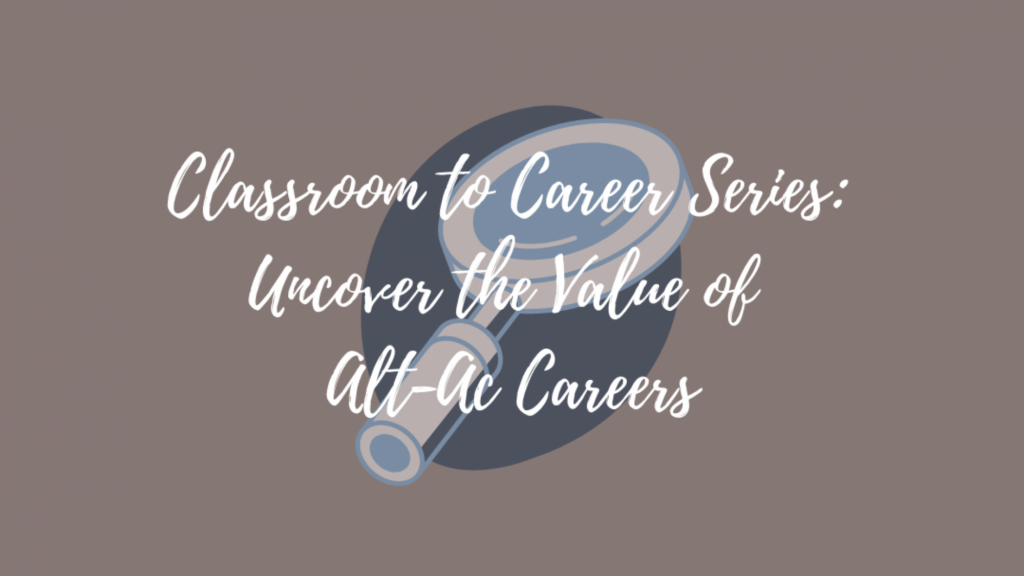
In this event, Professor Kathryn Temple, Director of Graduate Studies for the M.A. in Engaged & Public Humanities and M.A. in English presented a range of diverse careers available in the humanities. She talked about what “alt-ac” really means and how specialized skills in the humanities can take humanities professionals far beyond a university setting. This was an informative and fun conversation for attendants who might want to take the skills they’ve learned in their M.A. in new and exciting ways, beyond basic job opportunities in academe.
The event was part of the professional development “Classroom to Career” series. It was co-sponsored by the English Graduate Student Association (EGSA), the Department of English, and the M.A. Program in Engaged & Public Humanities (ENPH).
Public Dialogue “What Does it Mean to be American?”
Date: April 28, 2021
This event consisted on an interactive conversation, where participants were briefly paired in randomly selected break-out rooms to share what being an American means to them. They were encouraged to meet someone new and broaden their worldview in this humanizing virtual experience.
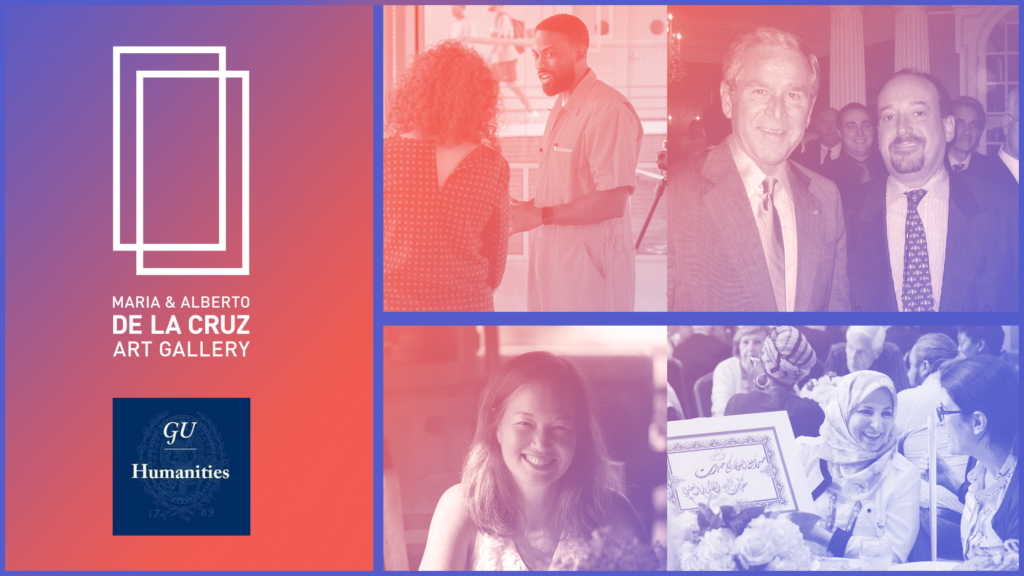
The conversation was moderated by Philippa P.B. Hughes, founder of Looking for America, a project that brings people together from across the political spectrum and the country to explore what it means to be American in a deeply polarized society. Art and storytelling are the foundation for creating deliberative dialogue that sparks humanizing conversations aimed at building relationships that can transform society.
The participants in this conversation included:
- Philippa P.B. Hughes (moderator), Social Sculptor + Chief Creative Strategist at Curiosity Connects Us and the founder of Looking for America. She produces creative projects that transform society through humanizing and compassionate conversations between people who might not normally meet. She has designed and produced hundreds of unconventional, delightful, and fun activations aimed at building social capital, social cohesion, and social discourse. Her practice prioritizes relationships and encompasses a multi-disciplinary approach that is informed by sociology, psychology, political science, community organizing, design thinking, art, and humanities. She leads CuriosityConnects.us , a partner in Looking For America, which is a national series inviting politically diverse guests to break bread and talk to each other face-to-face.
- Mike Gonzalez, Senior Fellow, Douglas and Sarah Allison Center for Foreign Policy and Angeles T. Arredondo E Pluribus Unum Fellow at The Heritage Foundation, and Sherrill Roland, artist and founder of The Jumpsuit Project. He writes on identity politics, diversity, multiculturalism, assimilation, and nationalism, as well as foreign policy in general. He spent close to 20 years as a journalist, 15 of them reporting from Europe, Asia, and Latin America. He left journalism to join the administration of President George W. Bush, where he was a speechwriter for Securities and Exchange Commission Chairman Christopher Cox before moving on to the State Department’s European Bureau. Gonzalez, who joined Heritage in March 2009, became a Senior Fellow in June 2014 and a chaired fellow in 2019. Gonzalez holds a bachelor’s degree in communications from Boston’s Emerson College, and an MBA from Columbia Business School.
- Sherrill Roland, artist and founder of The Jumpsuit Project. He is an interdisciplinary artist who creates art that challenges ideas around controversial social and political constructs and generates a safe space to process, question, and share. He was born in Asheville, North Carolina, and received an MFA in studio art from the University of North Carolina at Greensboro. Inspired by his prison experience for a crime he did not commit, he founded The Jumpsuit Project to raise awareness around issues related to mass incarceration. Roland’s socially engaged art project has been presented at Open Engagement Chicago, Oakland City Hall, and the Michigan School of Law. Last year, he was awarded the Art Fund for Justice grant and the Southern Arts, South Arts Grand Prize, and State Fellowship. He is a 2021 Creative Capital Awardee.
This program was co-sponsored by the Georgetown University Art Galleries and the Georgetown Humanities Initiative.
Humanities Round Tables: Careers in Art and Art History
Date: April 27, 2021
In this panel event, organized by the Georgetown University Department of Art and Art History, the Georgetown Humanities Initiative, the Cawley Career Education Center, Georgetown Art and Art History alums talked about their careers in the arts, and how they made the most of their Art and Art history degrees after leaving the hilltop.
The panelists included:

Nora Rosengarten (C’14), graduate student in Art History and Architecture at Harvard University, who focuses on prints and printmaking in the 18th, 19th, and 20th centuries, with a special emphasis on methodologies of materiality and process. Nora holds a B.A. in Art History from Georgetown University (2014) and an M.A. in the History of Art from Williams College/The Clark Art Institute (2019). Nora has been an intern at the Phillips Collection and the Clark Art Institute, and worked as a Curatorial Assistant in Paintings and Sculpture at the Clark Art Institute.
- Shawn Digney-Peer (C’97), Conservator in the Paintings Conservation Department of The Metropolitan Museum of Art. Shawn received a B.S. in French Language and Studio Art from Georgetown University (Washington, DC). He obtained a postgraduate diploma in the conservation of easel paintings at the Courtauld Institute (University of London, UK) and then undertook an internship and Samuel H. Kress Fellowship at the Hamilton Kerr Institute (University of Cambridge, UK), where he treated old master pictures. In 2005 Shawn moved to New York for an Andrew W. Mellon fellowship at the Metropolitan Museum and was hired the following year to care for Nineteenth Century, Modern, and Contemporary paintings. Notable treatments include works by Vincent van Gogh, Pierre Bonnard, Piet Mondrian, Odilon Redon, Joan Miró, Pablo Picasso, Georges Braque, Robert Rauschenberg, Franz Kline, Mark Rothko, Robert Motherwell, and Jackson Pollock. He has published pieces on the materials and techniques of Pablo Picasso, the cleaning of sensitive paint films and unprimed canvas with dry methods, and a textbook chapter that teaches the mimetic retouching of easel paintings to conservation students.
- Mary Ahearn (C’16), who graduated with double degrees in Art History & Italian and earned a Master’s degree in Art Business from Sotheby’s Institute of Art. She lives in London and works as the Modern & Contemporary Valuations Coordinator at Christie’s auction house.
- Kenlontae’ ‘Tae’ Turner (Art & Museum Studies, ‘19) who attended Christopher Newport University, where he majored in Studio Art and had a double minor in Art History and Museum Studies and graduated in 2017. While at Christopher Newport University, Tae was able to gain a greater appreciation of how much of an impact gallery and museum spaces can have on the public, and further developed his own skills as a visual artist. Tae was a part of Georgetown University’s Art & Museum Studies Masters Program. During his time at Georgetown, Tae held internships and jobs at the Smithsonian’s Freer Gallery of Art & Arthur M. Sackler Gallery, The Hirshhorn Museum and Sculpture Garden, and the National Museum of the American Indian. After earning his Masters’ Degree in 2019, Tae was offered a position at the Hampton University Museum, where he currently serves as their Curator of Collections. In this role, Tae helps the Museum Director and Associate Curator oversee the care of the collection, conduct research, and develop exhibitions and programming.
Writing Climate Change: A Roundtable
Date: April 26, 2021
This roundtable focuses on climate writing, with an emphasis on the meaning and role of “writing” in our understanding of climate change. The distinguished literary and cultural critics featured in this event reflected on their own relationship with writing in their respective scholarly domains. What difference do genre and mode make in thinking about our environmental crisis and its repair? Beyond mere transmission of scientific ideas, can language, emplotment, and imagination rewire affective circuits, reorient our historical consciousness and our sense of social justice, and recalibrate our relationship with the environment?
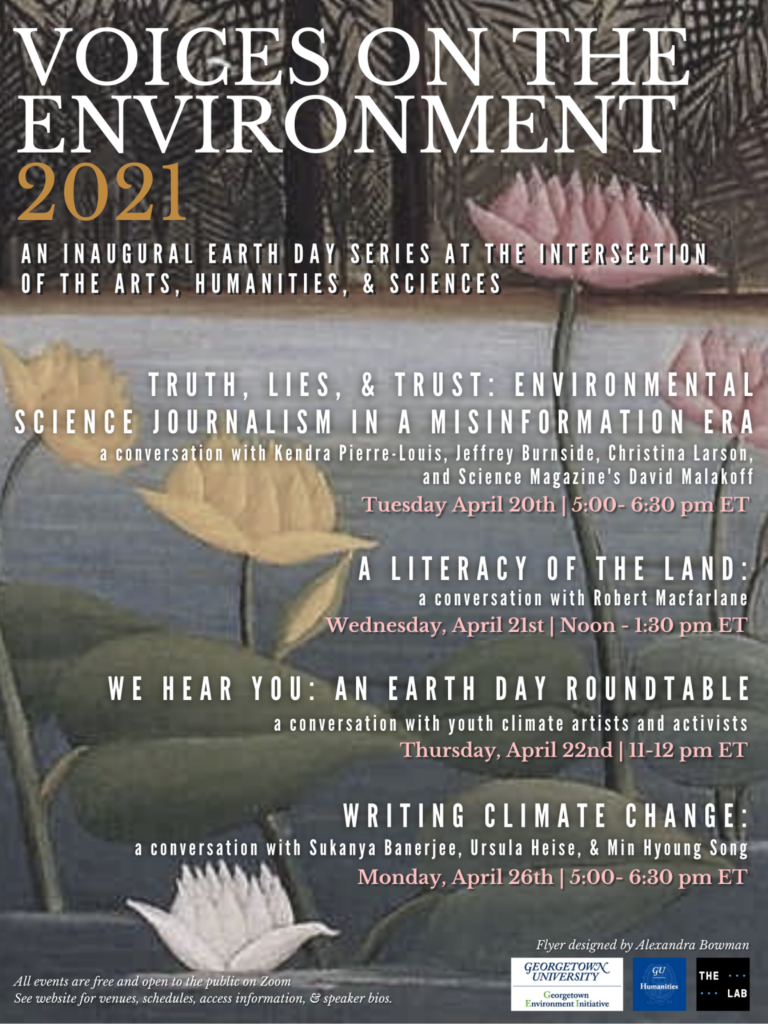
The panelists included Sukanya Banerjee, English professor at UC Berkeley who works on the literature and culture of Victorian Britain and its empire, and is interested in postcolonial studies, ecology, studies of transnationalism and diaspora, political theory, and South Asia; Ursula Heise, Marcia H. Howard Chair in Literary Studies at the Department of English in UCLA, whose research and teaching focus on contemporary literature; environmental culture in the Americas, Western Europe and Japan; narrative theory; media theory; literature and science; and science fiction; and Min Hyoung Song, Professor of English and Director of the Asian American Studies Program at Boston College, as well as a steering committee member of Environmental Studies and an affiliated faculty member of African and African Diaspora Studies. The roundtable was co-moderated by Professor Nicoletta Pireddu, Inaugural Director of the Georgetown Humanities Initiative, and Israel Hernandez Luna, Doctoral Student in Spanish and Portuguese.
The event was part of the first run of the “Voices on the Environment”, an Earth Day series of events at the intersection of science, the humanities and the arts that link environmental journalism, literary writing, activist performance, and critical approaches to climate change, the environment, and language. It was co-sponsored by the Georgetown Humanities Initiative, the Georgetown Environment Initiative and the Laboratory for Global Performance & Politics.
We Hear You: Earth Day Roundtable Discussion
Date: April 22, 2021

This event gathered six youth artists and activists from around the world for an intimate conversation about their experiences of organizing and creating in response to the climate crisis and chaos. It launched We Hear You—A Movement, a large-scale, women-led performance project centering youth voices in the movement for climate justice. Drawing inspiration from climate strikes, block parties, and environmental science, We Hear You seeks to cultivate connections between ecosystems of performance and action. The project asks: Who are we listening to? What are the ways we can hear one another and our more-than-human kin? How can we celebrate our interconnectedness and activate it for resilience and healing?
The artists and activists who participated in this encounter were Ashanee Kottage, a junior in the SFS majoring in STIA and minoring in Theater & Performance Studies (TPST); Eliza Palter, theatre artist based in Washington, DC, who received her Bachelor of Arts in Theatre & Performance Studies and Anthropology from Georgetown University in 2020; Pauline Owiti, climate activist based in Kenya, and founder of the Polly Foundation, which aims to train communities in the best practices for sustainable organic farming and agroforestry; Beatrice Ann Dolores, climate educator and advocate from the Philippines; and Myiah Smith, alumna who received her Bachelor of Science in Foreign Service/German Language and Culture, studying culture and politics with a concentration in ecology and fine arts. The conversation was moderated by Caitlin Nasema Cassidy, award-winning Actress and Producer, GU Alumna, and 2017-19 Fellow at Lab for Global Performance and Politics.
The event was part of the first run of the “Voices on the Environment”, an Earth Day series of events at the intersection of science, the humanities and the arts that link environmental journalism, literary writing, activist performance, and critical approaches to climate change, the environment, and language. It was co-sponsored by the Georgetown Humanities Initiative, the Georgetown Environment Initiative and the Laboratory for Global Performance & Politics.
A Literacy of the Land: A Conversation with Robert Macfarlane
Date: April 21, 2021
In this event, three veteran science and environmental journalists discussed what it is like to report on urgent environmental issues and cutting-edge science during an unprecedented era of misinformation, political polarization and distrust. These journalists –who work in radio, television and print– talked about the constraints and opportunities they face in transforming facts, data, and differing perspectives into compelling stories that connect with their audiences. What does it mean to be a journalist covering the climate crisis, threats to biodiversity, and public health challenges during what some have dubbed the “post-truth era”?
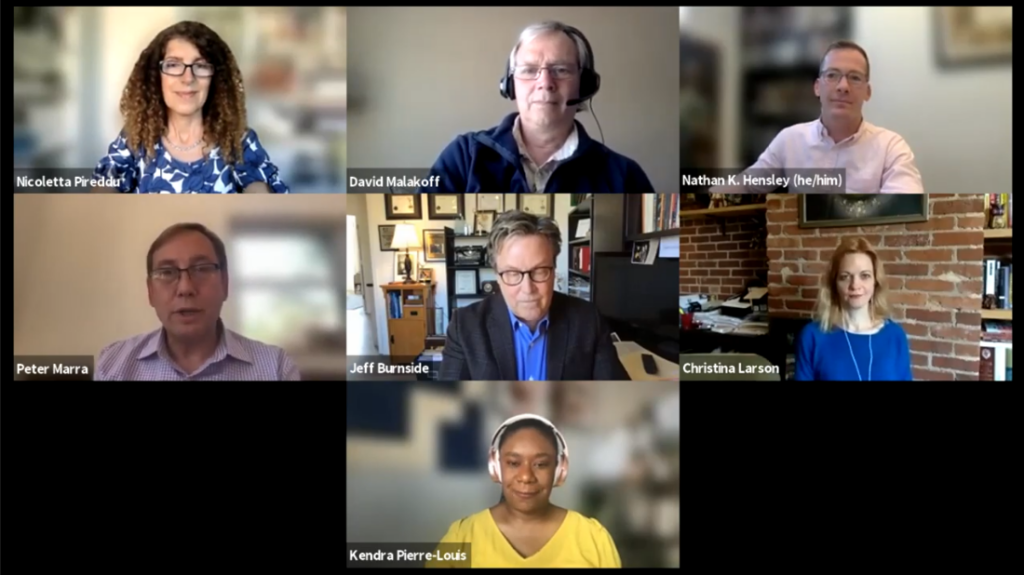
The panelists included Kendra Pierre-Louis, climate reporter with the Gimlet audio show How to Save a Planet, formerly with The New York Times and Popular Science; Jeffrey Burnside, documentary filmmaker and TV journalist, former president of the Society of Environmental Journalists; and Christina Larson, Global Science & Environment correspondent at the Associated Press, and former China correspondent for Science Magazine; in conversation with David Malakoff, Deputy News Editor for Science Magazine, and former editor at NPR’s Science Desk.
The event was part of the first run of the “Voices on the Environment”, an Earth Day series of events at the intersection of science, the humanities and the arts that link environmental journalism, literary writing, activist performance, and critical approaches to climate change, the environment, and language. It was co-sponsored by the Georgetown Humanities Initiative, the Georgetown Environment Initiative and the Laboratory for Global Performance & Politics.
New Chinese Approaches to Humanities Education
Date: April 16, 2021
The last two decades have seen innovative efforts at Chinese universities to strengthen humanities education, drawing on a range of resources including the Confucian tradition and existing liberal education models around the world. The China Forum for Civilizational Dialogue convened a panel of experts to address three key questions: What explains the revival of humanities education in China? What are its main contours and variants? How does it relate, if at all, to wider challenges of economic and social development facing the country?
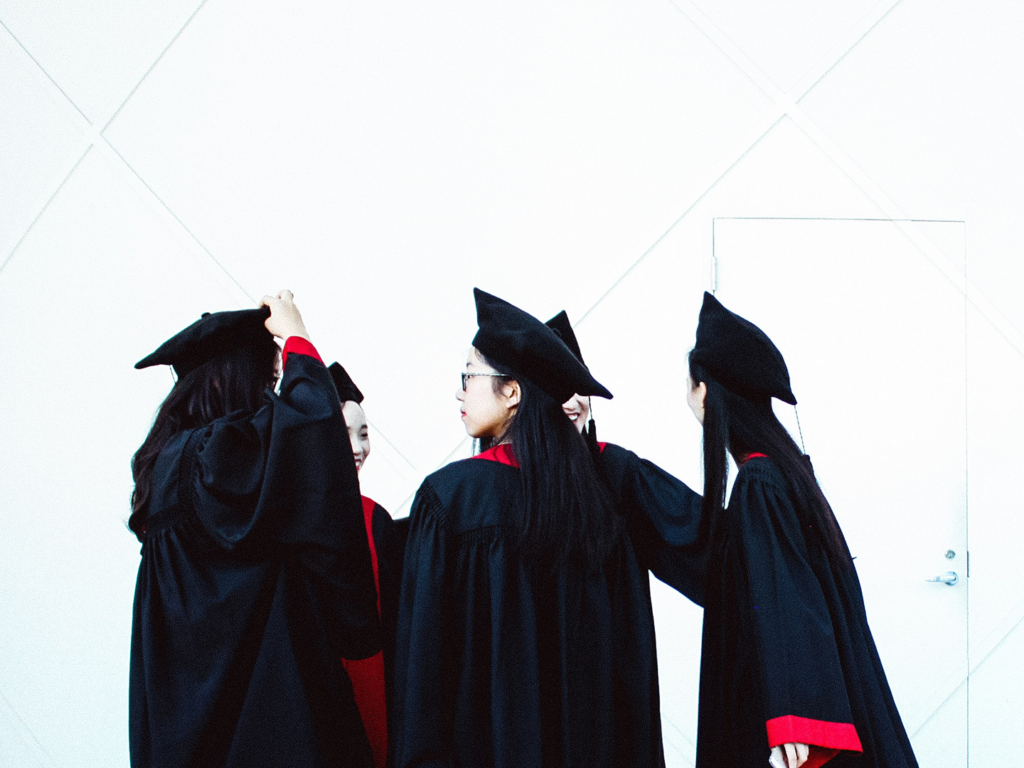
The panelists included Benoît Vermander, professor of religious studies in the Department of Philosophy at Fudan University; Kathryn Temple, professor in the Department of English and Founding Director of the M.A. in Engaged & Public Humanities; Shuchen Xiang, assistant professor of philosophy in the Department of Philosophy and Religious Studies and the Institute of Foreign Philosophy at Peking University, China; Tongdong Bai, Dongfang Chair Professor of Philosophy at Fudan University in China and Global Professor of Law at New York University School of Law; and Thomas Banchoff, vice president for global engagement at Georgetown University and professor in the Department of Government and the Walsh School of Foreign Service. The conversation was moderated by Daniel A. Bell, dean of the School of Political Science and Public Administration at Shandong University (Qingdao).
The China Forum, a collaboration between Georgetown University and La Civiltà Cattolica, convenes Chinese academics and public figures with international partners to discuss common challenges at the intersection of culture, ethics, and global society. Through academic seminars, public events, and an online platform, the China Forum is initially focusing on three topics: the global ecological crisis, humanities education for a global era, and the ethics of artificial intelligence.
Humanities Round Tables: Careers in Publishing & Professional Writing
Date: March 25, 2021
This event brought together professional publishers, authors, and agents. Attendants could learn about what these individuals do, how and why they got into a career in publishing and writing, how they maintained and grew within these spaces, and what advice they had for undergraduates just getting their start.

Panelists included:
Clive Priddle, Publisher, Hachette Book Group, PublicAffairs Books. Clive Priddle joined PublicAffairs as executive editor in 2003. He became Editorial Director in 2006, and Publisher in 2012. Since joining PublicAffairs, the authors he has edited include Abhijit V. Banerjee and Esther Duflo, Linda Robinson, Natan Sharansky, Kishore Mahbubani, John Kerry, David Rothkopf, Richard Haass, and Muhammad Yunus. Prior to that, he was publishing director of Fourth Estate, a division of HarperCollins, and previously worked for four years at Penguin UK.
- Ericka Souter, Journalist & Author. Ericka Souter is a parenting expert on Good Morning America and other national network shows. She writes for mom.com, cafemom, and additional sites that reach millions of moms monthly. It’s her job to speak to parents across the country and to stay on top of the issues, controversies, and trends most affecting families today. Her work has also appeared in Self, Cosmopolitan, Essence, HuffPost, and WebMD and she has been on staff at Us Weekly and People. Her first book, How to Have a Kid and a Life: A Survival Guide, comes out in August.
- Elizabeth Velez, Writer & Georgetown Professor. Elizabeth Velez is the Academic Director of the Community Scholars Program and a professional lecturer in the Women’s Studies Program. She teaches “Feminist Theory” for Women’s Studies. A writer and journalist, she has covered feminist issues for national publications for the past ten years. Professor Velez’s most recent book, The Hell With Love, a feminist anthology of poetry, was published in January 2002. She is currently working on Kiss Off: Poems to Set You Free, an annotated radical feminist anthology of poetry.
- Molly Chehak, Managing Director of CNDLS & Instructor in CSP. As the managing director for CNDLS, Molly manages and implements the strategic, organizational, and operational activities of the Center, while also teaching in the Community Scholars Program. She brings to CNDLS extensive experience in educational technology, faculty and program development and evaluation, as well as change management. Prior to Georgetown, Molly had spent years in K-12 teaching and administration, and worked at Time Warner as an assistant editor.
- Al Bertrand, Director of Georgetown University Press. Al manages the Press’ operations and acts as an acquisitions editor for books in religion and theology and for titles about Washington, DC, and the region. Prior to joining Georgetown, Al worked for the Princeton University Press as the press’s Editor-in-Chief, leading editorial efforts and expanding international authorship, and also previously served as Editorial Director for John Wiley and Sons in Oxford.
This event was put on in partnership by the Georgetown College Dean’s Office, Cawley Career Education Center, the Center for Multicultural Equity & Access, and the Georgetown Humanities Initiative.
Classroom to Career Series: First Impressions on the Job
Date: March 19, 2021
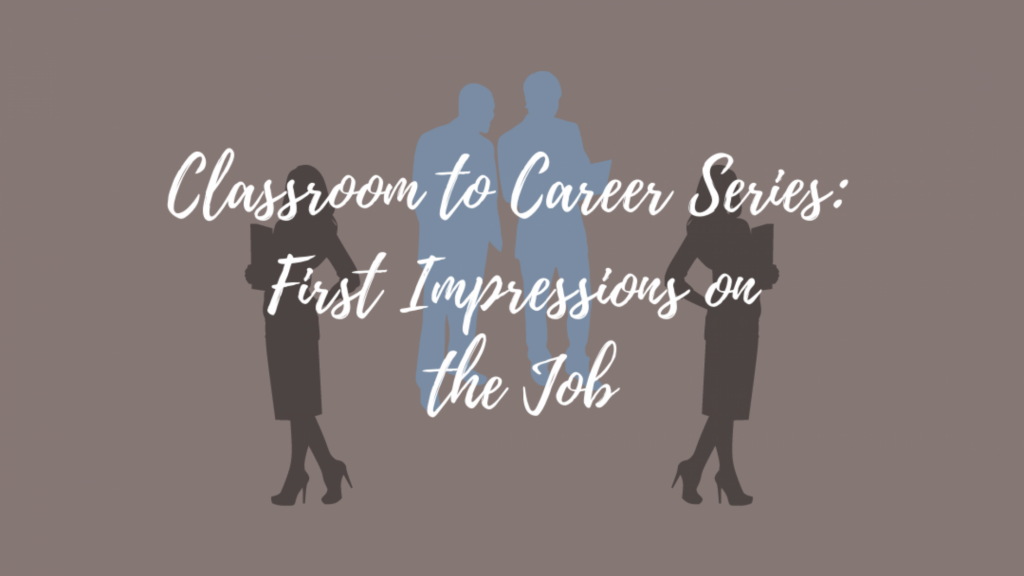
This event featured a panel of four M.A. English alumni: Nicholas DeMayo (M.A.’ 20), Bezawit Yohannes (M.A.’ 20), John James (M.A.’ 17, and Kelly Coyne (M.A.’ 17). They shared about their experiences starting new positions both before and during the COVID-19 pandemic. Whether you’re beginning a new job or starting a new graduate program, first impressions are key, and the panelists described their experiences and provided advice to help attendants start strong no matter the next step in their career paths. They discussed not only how to make a good first impression in a new position, but how to take their own first impressions of a new department, company, or organization and adapt successfully.
The event was part of the professional development “Classroom to Career” series. It was co-sponsored by the English Graduate Student Association (EGSA) and the Department of English.
Classroom to Career Series: Focus on Freelancing
Date: February 26, 2021
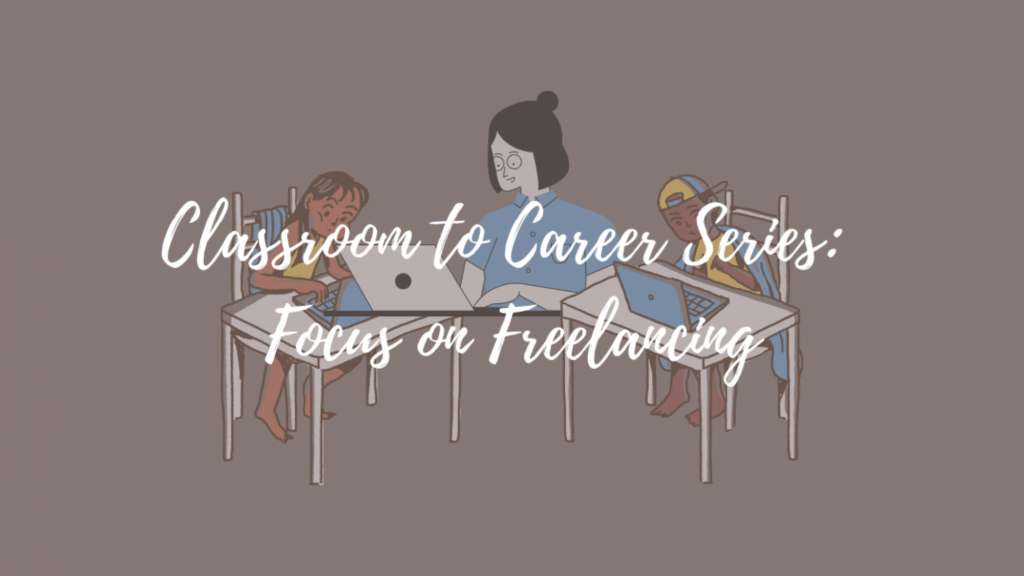
This event featured two M.A. English alumni, Grace Foster (M.A.’17) and Casey Mank (M.A.’17) who co-founded Bold Type, LLC, a women-owned consulting firm with the mission to change the way people write so they can express their ideas with confidence and clarity. They shared how they got into freelancing and provided tips and tricks for anyone interested in pursuing this as a career move pre- and/or post-degree. They talked with Professor David Lipscomb, Director of the Writing Center at Georgetown.
Casey Mank has taught in writing classrooms for over 10 years, most recently at Georgetown University’s McDonough School of Business and School of Nursing and Health Studies. She has taught writing to professionals at organizations including Kellogg’s, MasterCard, Sephora, the Aspen Institute, Viacom Media, the EPA Office of the Inspector General, the PR Society of America, the National Association of Government Communicators, and many more. Grace Aldridge Foster has been training writers for over a decade. She has worked with organizations including the U.S. Special Operations Command, Capital One, Biogen, the Aspen Institute, the National Parks Service, and Skadden, Arps, Slate, Meagher, and Flom LLP. She has a master’s degree in English from Georgetown University, and she teaches professional writing at Georgetown’s School of Continuing Studies and McDonough School of Business.
The event was part of the professional development “Classroom to Career” series. It was co-sponsored by the English Graduate Student Association (EGSA) and the Department of English.
“What Were We Thinking: A Brief Intellectual History of The Trump Era”
Date: February 18, 2021
This event, co-sponsored by Georgetown College and the Department of English, consisted on a conversation between Carlos Lozada and Maureen Corrigan.
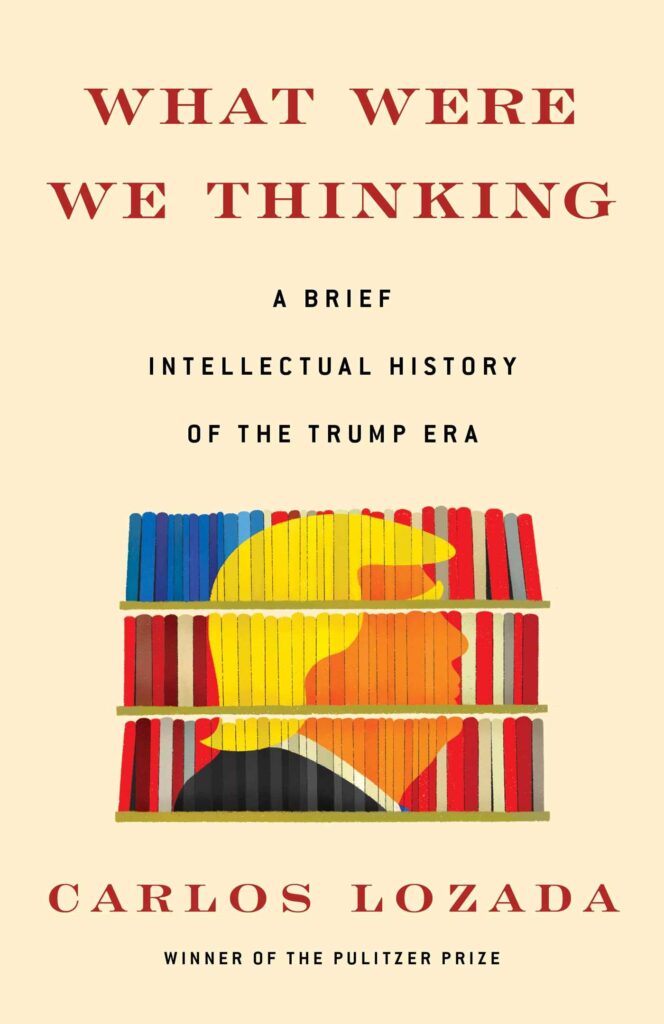
Maureen Corrigan is The Nicky and Jamie Grant Distinguished Professor of the Practice in Literary Criticism in the Department of English at Georgetown University. For the past 31 years, Corrigan has been the weekly book critic on the Peabody Award-winning NPR program, ”Fresh Air.” She is also a Mystery Columnist for The Washington Post and publishes regularly on NPR on-line and The Wall Street Journal. In 2018, she received the National Book Critics Circle’s Citation for Excellence in Reviewing.
Carlos Lozada is winner of the 2019 Pulitzer Prize in Criticism, the nonfiction book critic of The Washington Post, and author of What Were We Thinking: A Brief Intellectual History of the Trump Era. He received the 2015 National Book Critics Circle’s citation for excellence in reviewing. Previously, he was managing editor of Foreign Policy magazine and a Knight-Bagehot fellow in economics and business journalism at Columbia University.